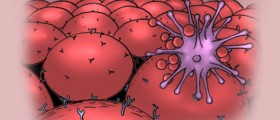
Herpes virus is known as the cause of mouth sores. This disease may affect and degenerate the central nervous system (the brain) causing herpes simplex encephalitis. Besides the brain, this virus is also known to invade the face, mouth, genitals, eyes (ocular herpes) or fingers and toes (herpetic whitlow). The same virus may also lead to gladiatorum, Mollaret’s meningitis, neonatal herpes or Bell’s palsy.
HSV encephalitis is usually caused by HSV 1 virus and patients are in general adolescents, people over 50 years of age or seropositive patients with positive family history to oro-facial herpes. Herpes simplex virus (HSV) is commonly transmitted through the oral contact with some already infected person. Once inside the body, virus travels along nerve axon and moves to the brain, causing dormant infection at first and then affecting temporal lobes.
HSV Encephalitis Classic Symptoms
Patients diagnosed with HSV encephalitis usually experienced high body temperature, headaches, vomiting, anorexia, weakness of the muscles on one side of the body, visual field and memory loss and seizures. In some cases, people with encephalitis due to HSV infection have also suffered from confusion, alteration of consciousness and some other behavioral changes.
Symptoms may also include dysphasia (difficulty to understand language), papilledema, deficits of the cranial nerve, swelling of the temporal lobe or increased amount of proteins in the cerebrospinal fluid as well an increase of lymphocytes in the blood.Treatment for a Person Suffering from HSV Encephalitis
Herpes simplex virus in the brain is responsible for cell damage, both because of the viral particles and the response of the immune system of the host. As we already mentioned, the brain gets infected when the virus gets transported through neurons form some peripheral site in the body. Patients diagnosed with HSV encephalitis have to get treatment on time, in order to minimize or completely avoid deterioration of the brain, long term brain damage and possible fatal outcome.
Nutritional support and monitoring for intracranial pressure and seizures are primary means of treatment. Increased cranial pressure can be treated with mannitol or some steroid drugs, while patients suffering from seizures usually get some anti-epileptic medications and benzodiazepines.
Proper evaluation is very important form this neurological problem. Doctors may prescribe antivirals such as vidarabine or acyclovir, in order to shorten the duration of the illness and prevent possible health complications, neurological damage and lethal consequences. Lumbar puncture and biopsy are used only if there are no antiviral medications proven to be non-toxic.

















Your thoughts on this
Loading...